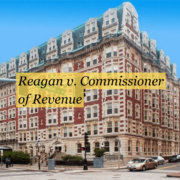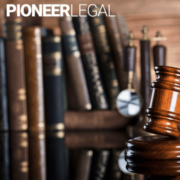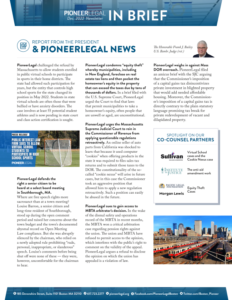Working for Judicial Reform in Ukraine
BOSTON, June 15, 2023 — For more than a year, the world has witnessed Ukraine’s military struggle to push back a major Russian invasion. But another struggle that is vital to Ukraine’s future has been unfolding for several years—the effort to reform the nation’s judiciary, root out corruption, and help Ukraine secure its place as a nation dedicated to the rule of law.
On June 15, retired Massachusetts Supreme Judicial Court Justice Robert Cordy spoke at the University of Massachusetts Club in downtown Boston on his participation in the Ukrainian Judicial Ethics Council. The event was sponsored by Pioneer Public Interest Law Center (PPILC).
Justice Cordy, a member of the PPILC board, was joined by Bohdan Vitvitsky, a former federal prosecutor and diplomat. Together, they explored the recent history of Ukraine, including the toxic legacy of “legalized lawlessness” that the nation inherited when, in 1991, it gained its independence after seven decades as part of the Soviet Union.
Justice Cordy explained the intricacies of the judicial system in Ukraine and the challenges that he and other international experts—including from Wales and Estonia—faced as they worked with the Ukrainians to identify which members of the nation’s judiciary were truly qualified. He noted, for example, that of some 112 candidates they were to review, 55 were deemed non-compliant with the necessary standards for conduct, and another 20 withdrew before being interviewed.
In spite of the many challenges, Justice Cordy noted that the working relationship he had with the Ukrainians “was by and large incredibly positive.”
“I got to really appreciate that they were completely dedicated to the mission, the future of the judiciary,” he told attendees.
Reflecting on observations offered by Mr. Vitvitsky, Justice Cordy added that while reducing corruption is largely a legal process, there are also important cultural elements. His experiences, he noted, give him confidence that Ukraine is on the path to reform. While there were occasional disagreements, he said, “they all worked really hard together.”
Pioneer Public Interest Law Center (PPILC) is a nonprofit, nonpartisan public-interest law firm that defends and promotes educational options, accountable government, and economic opportunity. Through legal action and public education, PPILC works to preserve and enhance liberties grounded in the constitutions and civil rights laws of the United States.





